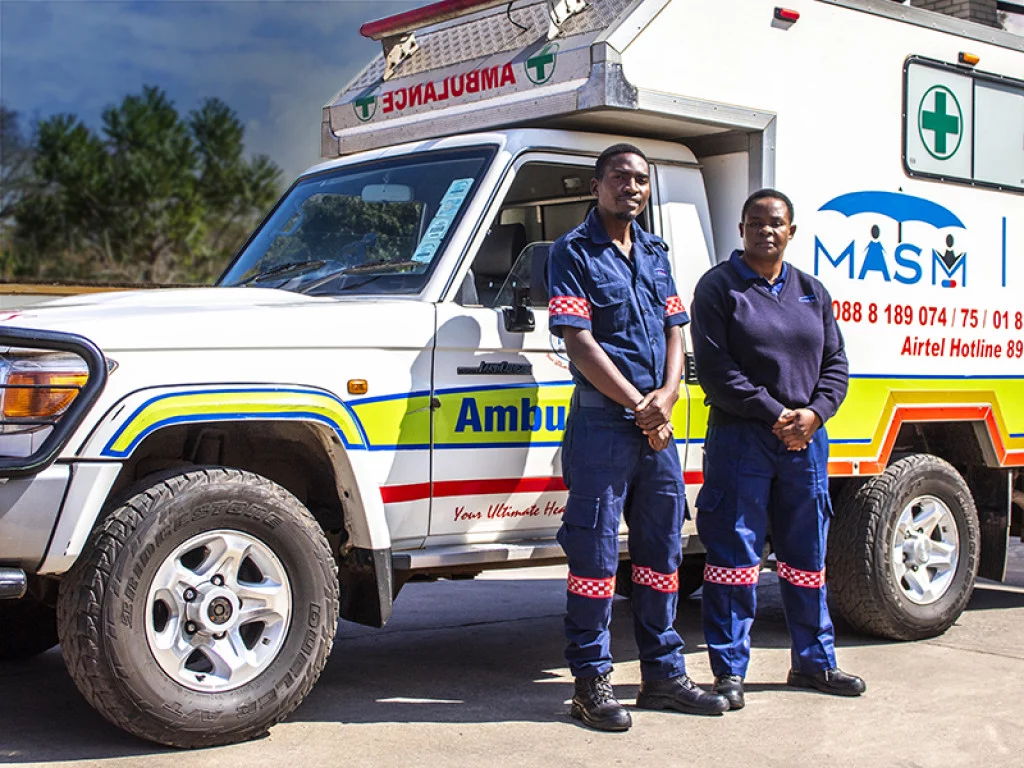As Malawi’s first, and largest, healthcare service provider, the Medical Aid Society of Malawi champions quality healthcare for all. We discuss accessibility and future growth with CEO, Sydney Chikoti.
INTRODUCTION
Rather like the steep peaks and trenches of the Great Rift Valley that shape the country’s topography, the landscape of Malawi’s healthcare sector is one defined by arduous challenges to overcome and hurdles to climb.
This physical terrain itself represents a natural impediment to universal health coverage (UHC), with vast swathes of Malawi’s population residing in rural areas where remote access can be a major issue. The country’s primary care facilities are located in the most populous cities of Lilongwe, Blantyre, Mzuzu and Zomba, with smaller operations including rural clinics, dispensaries and health centres dotted throughout the rest of Malawi.
As is common to many areas in sub-Saharan Africa (SSA), Malawi must confront rising population levels in the face of an already overburdened healthcare system.
“The healthcare industry in Malawi remains underdeveloped, underregulated and with a very low penetration of less than one percent of the population.”
As orator of this opening statement, Sydney Chikoti is fully alert to the fraught context and difficult predicament of Malawi’s current health care system. Chikoti sits as CEO of the country’s largest medical aid service provider, and a pioneering leader in the provision of affordable healthcare solutions for all Malawians.
Enter the Medical Aid Society of Malawi (MASM).
Since its establishment in the 1960s, MASM has grown significantly from its roots as a small organisation to become a renowned household name. Indeed, MASM now holds over an 80 percent share of the national private health insurance market.
“MASM is the largest health insurance services provider in the country. We boast the largest service provider network, with over 300 service providers that offer various healthcare services to the Malawian population in all four corners of the country,” introduces Chikoti.
“Our staff complement has grown from 20 to over 100 in recent years. This excellent rate of growth has come about through our quest to always provide high-quality healthcare solutions to our members at affordable rates.”
This truly national reach extends from the company’s head office in Blantyre, to two further offices in the northern region of Mzuzu and in Lilongwe, where MASM is strategically located to cater to the needs of local government and Malawi’s main corporate entities.
“The society has also established links with strategic partners in South Africa and India to ensure seamless access to healthcare service facilities for its members who require such services in those countries,” he adds.

“We strive to provide member-centric products as we provide the ultimate healthcare solution to all”
Sydney Chikoti, CEO, MASM
MEMBERSHIP AND SERVICE OFFERING
The society works as a member-owned and operated entity, presided over by the secretariat and CEO. The majority of MASM’s members are formal sector employees who prefer to receive medical treatment from private facilities where health insurance is applicable. Elsewhere, a growing number of parastatals and smaller firms contract MASM to administer health care service schemes on their behalf.
MASM offers a wide spectrum of products, ranging from premium to basic, affordable services, designed to cater to a varied populace.
“This ensures that the majority of Malawians can pick what they can afford,” says Chikoti. MASM members can choose from three different levels of membership – VIP, Executive, and EconoPlan – which are high-end to low-end schemes respectively.
In addition, the company provides link-on products and tailor-made schemes to cater for a wider population, complementing value-added services such as the MASM Emergency Medical Service. The latter provides a critical fleet of fully crewed and equipped ambulances.
Other value-added services include the recent introduction of a USSD-based mobile service, funeral benefit cover, a dedicated pensioner’s account, the MASM@Ur Doorstep payment facility, and MASM Serve – a chronic medicine benefit facility that provides members with access to the appropriate medication.
“We strive to provide member-centric products as we offer the ultimate healthcare solution to all,” Chikoti shares proudly.
Aside from this, MASM continues to navigate people’s expectations of health insurance and the value of what it provides as a means of financing health care.
“These expectations may be whether health insurance represents value for money, issues of equity, to the role of possible demand-side factors such as income, education, sex, geographical location, marital status, age, health status, and dependents, with the supply side factors such as service quality, accessibility and risk, determining the acquisition of membership in the schemes,” he elaborates.

GOING FOR GROWTH
Although Chikoti informs us that over 150,000 lives are currently covered through MASM’s health services, he recognises that this is just a tiny portion of Malawi’s entire population, which currently sits at roughly 18 million people.
A host of challenges abound that threaten to hamper the progress of MASM’s ambitious growth agenda, as it continues to champion its vision of accessible healthcare for all Malawians.
“There is a mixture of challenges and excitement in the industry, especially in strategising the buy-in of potential members while at the same time retaining the existing membership,” he comments.
Chikoti attributes MASM’s low penetration into the healthcare industry to the fact that the Malawian government provides complimentary medical services in government hospitals with no mandatory health insurance in place. As such, MASM must work with a population that is accustomed to having the government provide healthcare services for free.
“Although MASM membership has improved with multi-industry membership recruitment, this growth has not been significant in the past two years mostly due to the COVID-19 pandemic, as businesses had to rethink their approach and shift priorities,” observes Chikoti.
Regardless, MASM remains unwavering in its pursuit.
“We formed a subsidiary company with its own board management who are running a series of private clinics,” he explains. “They have the mandate to grow that business, since, in order for health insurance as an industry to grow, there have to be multiple private clinics.”
At present, the MASM Medi Clinics amount to five separate sites. Whilst this network is geared for expansion, its growth remains subject to the imposition of government regulations which may limit MASM from service provision.
By increasing the number of private clinics in cities, rural areas, and villages, the value of such facilities becomes more obvious to the general population. As private clinics, individuals may not have the financial capacity to access these services, which is where MASM has a critical role to play.
“We have seen that with the growth of the private sector in establishing these facilities and private clinics, comes more enquiries and an increase in the amount of people joining MASM,” Chikoti tells us happily.
TRAINING AND EMPOWERMENT
Across SSA, Malawi has one of the highest population-to-medical professional ratios. As such, the country, and by extension MASM, places a huge emphasis on the development and cultivation of medical personnel to overcome labour shortages.
One such example is the medical college at the University of Malawi, which since 1991 has sought to alleviate the shortage of doctors. It is this same university where Chikoti himself spent many years of his career teaching finance and accounting, before transitioning into a role at National Insurance Company Limited (NICO), Malawi’s largest insurance company. As General Manager of NICO’s health insurance arm, Chikoti encountered MASM, since the company was using its administration services.
Today, MASM supports the national education of healthcare professionals by partnering with public institutions such as the University of Malawi to offer internships for young students.
“We arrange training that is relevant to the students, but it’s also to the benefit of MASM itself,” Chikoti says.
In addition to providing opportunities for those who are new to the industry, MASM takes pride in nurturing its own workforce and encouraging staff progression.
“We ensure that our staff remain motivated at all times. We empower them in different ways, but especially by encouraging training and self-development.
“Internally, we always recognise those of our staff who work beyond the norm and make sure that they are rewarded for their work,” Chikoti elaborates.
Additionally, the work that MASM does is by its very nature empowering and rewarding.
“Being a service industry, from time to time, we do get feedback from our clients. When those clients come forward and show recognition for the service that has been provided, that is extremely satisfying for our members of staff.”
Chikoti highlights one such example during the COVID-19 pandemic, when MASM staff were recognised for their diligent work by one of the company’s larger clients – the United States Agency for International Development (USAID) – who visited MASM’s premises to reward staff with individual certificates.

ACCELERATING DIGITALISATION
Continuing on the topic of the COVID-19 pandemic, it was this challenging period that highlighted the need for all companies across myriad sectors to keep pace with digitalisation and incorporate technology to compensate for the lack of physical interaction.
“We had to empower our staff with the necessary gadgets and so on so that they could work from home and perform their normal tasks, whilst also interfacing with our service providers as well as our clients – the MASM members. Throughout the peak period of that time, our members were still able to access services without any problems,” comments Chikoti.
This technological access was critical for MASM staff to continue operations uninterrupted. But the MASM digital agenda is also instrumental in furthering the company’s accessibility goals, by implementing ease of access to the company’s services in the virtual realm. With COVID-19 as the catalyst, MASM set about a new way of operating.
“We realised that we needed to look beyond doing business as usual – people weren’t going to be coming to the front desk to pay for their membership and get approvals. We had to ensure that we quickly went into the digitalisation of all our services,” he affirms.
Now, MASM customers no longer need to register in person at a company office but can do so online instead. Similarly, for cover payments, MASM’s members can make use of a host of digital platforms to process premium payments.
“We have integrated with mobile operators but also many commercial banks who are now able to collect premiums for us. Members don’t need to come to the office and their contributions will still be updated immediately to confirm their membership status.”
Complementing this integration is an app that MASM members can download to access their individual accounts and enjoy real-time visibility of their membership cover and any premiums left outstanding.
“This is one area that we have paid significant attention to recently to make it easier for us to service both our members and the service providers,” says Chikoti.
A HEALTHY FUTURE
The years ahead are exciting for MASM, with further growth firmly on the horizon.
“Last year, the Civil Service signed up to a contract with us to help grow our membership,” shares Chikoti. “We are extremely excited about this since they are the biggest employer in the country.”
By becoming a registered employer, MASM’s reach will extend to civil servants everywhere in Malawi, from major cities to village level.
“Through this, we expect our membership to grow significantly. Soon, we hope to reach at least 70,000 new members. It is a challenge, but we believe it is one that we will be able to surmount.”































